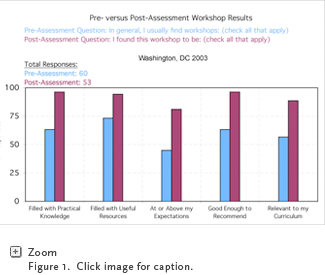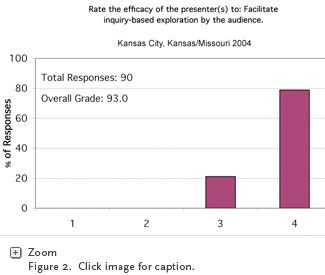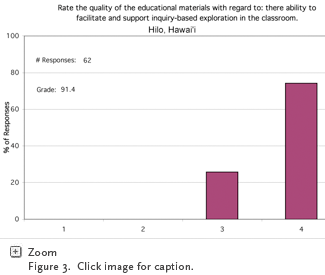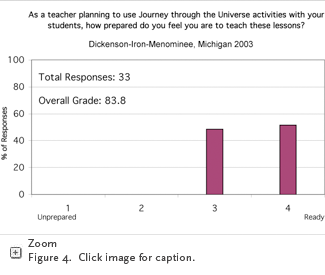|
 |
 |
 Fundamental
objectives for the Educator Workshops: Fundamental
objectives for the Educator Workshops:
- Provide attendees an understanding of the
entire Journey through the Universe program that
has been customized for the community. Specifically,
provide an understanding of: the Learning Community Model
and the program synergy realized through its implementation;
the other Journey program elements to be delivered
(e.g., Classroom Visits, Family and Public Programs);
the program objectives; the schedule of activities throughout
the academic year; and resources available on a continuous
basis.
- Mobilize the education community in support
of the other Journey through the Universe program
elements, and identify their roles in these programs.
- Provide a clear understanding of the chosen
Education Module, including: the lesson structure; the storyline
across the lessons, lesson objectives; and connections to
national and local standards.
- Provide training on the lessons and model
best teaching practices for facilitation of inquiry-based
exploration in the science classroom.
|
 |
 Assessment
of a Journey through the Universe Educator Workshop
is conducted using third generation pre- and post-workshop
questionnaires. The pre-workshop questionnaire is filled
out by attendees on arrival and collected prior to the formal
start of the workshop. It assesses respondent background
in science teaching and curriculum development, familiarity
with Earth and space science content, familiarity with inquiry-based
learning in the classroom, and their typical expectations
for a professional development workshop. The post-workshop
questionnaire is filled out by attendees and collected at
the end of the workshop. It assesses the quality and
effectiveness of the presenters and the workshop delivery;
the quality of the educational materials; and the workshop
logistical arrangements and comfort of the venue. The
questionnaires secure both quantitative data and commentary. Assessment
of a Journey through the Universe Educator Workshop
is conducted using third generation pre- and post-workshop
questionnaires. The pre-workshop questionnaire is filled
out by attendees on arrival and collected prior to the formal
start of the workshop. It assesses respondent background
in science teaching and curriculum development, familiarity
with Earth and space science content, familiarity with inquiry-based
learning in the classroom, and their typical expectations
for a professional development workshop. The post-workshop
questionnaire is filled out by attendees and collected at
the end of the workshop. It assesses the quality and
effectiveness of the presenters and the workshop delivery;
the quality of the educational materials; and the workshop
logistical arrangements and comfort of the venue. The
questionnaires secure both quantitative data and commentary.
Download Educator Workshop Questionnaires
Pre-Assessment
(PDF, 146 KB)
Post
Assessment (PDF, 164 KB)
On receipt of the questionnaires, all quantitative
data and all comments are entered into a database and an Educator
Workshop assessment report is generated. Samples
of the quantitative analysis portion of the report, reflecting
programming in seven communities, are provided in graphical
format at the bottom of this page. The sample
reports reflect a diverse array of customized workshops, including:
Master Teacher Workshops, workshops for grades K-12 teachers,
workshops for a single grade level, workshops for just elementary
school teachers, and a distance learning workshop. |
| |
 |
| The pre-assessment questionnaire asks respondents
to identify both positive and negative attributes associated
with workshops they typically attend by checking off the appropriate
attributes on a list. The post-assessment questionnaire
asks respondents to identify those attributes that apply to
the workshop they just attended, using the same list.
By comparing the pre- and post-results a description emerges
regarding the audience’s expectations for a workshop, and whether
the Journey through the Universe workshop met or exceeded
those expectations. Figure
1 is a typical positive attributes graph. Journey
through the Universe workshops consistently
far exceed audience expectations in all categories.
|
| |
 |
 The
questionnaire asks the respondent to rank the efficacy of
the presenters and the quality of the educational materials,
each in a number of categories, on a 1 to 4 scale. The questions
are provided below. The
questionnaire asks the respondent to rank the efficacy of
the presenters and the quality of the educational materials,
each in a number of categories, on a 1 to 4 scale. The questions
are provided below.
Rate the efficacy of the presenter(s) to:
- Present a science content overview that provided
a conceptual foundation for the lessons.
- Model best teaching practices.
- Present material in an understandable and grade-appropriate
manner.
- Present information in a dynamic and entertaining
way.
- Facilitate inquiry-based exploration by the audience.
See Figure
2.
Rate the overall quality of the educational materials
for which you received training regarding:
- Their completeness in terms of your ability to effectively
teach these lessons in your classroom (completeness regarding,
e.g., inclusion of objectives, connections to standards
and benchmarks, content overviews, lesson prep, lesson plan,
interdisciplinary connections, assessment rubrics, student
worksheets).
- The quality of their instructional design to facilitate
effective and efficient management of the lessons in the
classroom, including prep, warm-up, facilitation of activities,
assessment of student performance, and extension activities.
- Their relevance to your curriculum.
- Their relevance to the state standards.
- Their ability to facilitate and support inquiry-based
exploration in the classroom. See Figure
3.
Respondents also rank workshop logistical arrangements and
the comfort of the venue in a number of categories.
The ranking of 1 through 4 for each question can be equivalently
viewed as having the following assignments: |
| |
Ranking
4 (very effective)
3 (effective)
2 (somewhat effective)
1 (not effective) |
 |
Grade Assignment
100
66.6
33.3
0 |
 |
|
| |
This implies that if all the respondents assigned
a 3 out of 4 to a question, corresponding to ‘effective’,
the grade would only be a 66.6. The grading is harsh, but
the expectations from the community and the program team are
great. In general, we expect grades of 87.5 (a ranking
of 3.5) or better.
Data obtained for each of the questions is associated with
a graph. Figure
2 is a typical result for one of the questions regarding
presenter efficacy. Figure
3 is a typical result for one of the questions addressing
the quality of the educational materials. |
| |
 |
 At
the end of a Journey workshop a salient benchmark
question is whether the attendees feel prepared to implement
the lessons in the classroom. Figure
4 provides a typical response on the 1 to 4 scale. We
expect a grade of 80 or higher for this question. At
the end of a Journey workshop a salient benchmark
question is whether the attendees feel prepared to implement
the lessons in the classroom. Figure
4 provides a typical response on the 1 to 4 scale. We
expect a grade of 80 or higher for this question.
The National Center for Earth and Space Science Education
will work with communities to augment this baseline assessment
with tools and protocols that can: 1) determine if teachers
are indeed implementing the lessons in the classroom, and;
2) determine whether students are learning. The latter can
be determined through assessment protocols that interface
with the assessment rubrics already embedded in each lesson.
Download Sample Educator Workshop Assessment Reports
Washington, DC, 2003
Grade
6 Educator Workshop (PDF, 50 KB)
Dickinson/Iron/Menominee, Michigan,
2003
Grade
K-4 Educator Workshop (PDF, 50 KB)
Marquette, Michigan, 2004
Grade
K-8 Educator Workshop (PDF, 50 KB)
Kansas City, Kansas/Missouri, 2004
Grade
K-12 Educator Workshop (PDF, 50 KB)
Labette County, Kansas, 2005
Distance
Learning Workshop for Master Teachers (PDF, 60 KB)
Kansas City, Kansas/Missouri, 2005
Master
Teacher Workshop (PDF, 140 KB)
Grade
K-8 Educator Workshop (PDF, 140 KB)
Hilo, Hawai’i, 2006
Master
Teacher Workshop (PDF, 60 KB)
Grade
K-12 Educator Workshop (PDF, 60 KB) |
|
|
